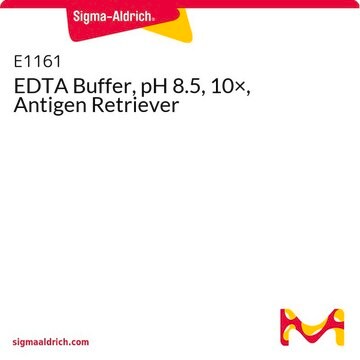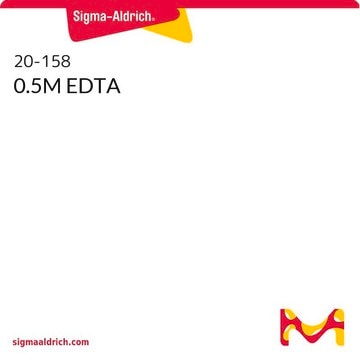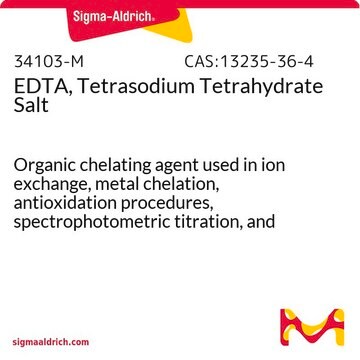E6758
Ethylenediaminetetraacetic acid
anhydrous, crystalline, BioReagent, suitable for cell culture
Synonym(s):
(Ethylenedinitrilo)tetraacetic acid, EDTA, Edathamil, Ethylenedinitrilotetraacetic acid
About This Item
Recommended Products
grade
anhydrous
product line
BioReagent
Assay
≥98.5%
form
crystalline
reaction suitability
reagent type: chelator
technique(s)
cell culture | mammalian: suitable
pH
2.5 (23 °C, 10 g/L)
mp
250 °C (dec.) (lit.)
solubility
3 M NaOH: 100 mg/mL
density
1.46 g/cm3 at 20 °C
cation traces
C: 40.7-41.5%
N: 9.3-9.8%
SMILES string
OC(=O)CN(CCN(CC(O)=O)CC(O)=O)CC(O)=O
InChI
1S/C10H16N2O8/c13-7(14)3-11(4-8(15)16)1-2-12(5-9(17)18)6-10(19)20/h1-6H2,(H,13,14)(H,15,16)(H,17,18)(H,19,20)
InChI key
KCXVZYZYPLLWCC-UHFFFAOYSA-N
Looking for similar products? Visit Product Comparison Guide
Application
- as a component of peptide dilution buffer for intracellular BH3 (Bcl-2 homology (BH) domain) profiling and validation
- as a medium component in the hepatic stellate cell (HSCs) culture
- as a component of homogenization buffer for protein extraction from eye tissues
- for stopping benzonase reaction in lysis buffer
Biochem/physiol Actions
Signal Word
Warning
Hazard Statements
Precautionary Statements
Hazard Classifications
Eye Irrit. 2
Storage Class Code
11 - Combustible Solids
WGK
WGK 2
Flash Point(F)
Not applicable
Flash Point(C)
Not applicable
Personal Protective Equipment
Certificates of Analysis (COA)
Search for Certificates of Analysis (COA) by entering the products Lot/Batch Number. Lot and Batch Numbers can be found on a product’s label following the words ‘Lot’ or ‘Batch’.
Already Own This Product?
Find documentation for the products that you have recently purchased in the Document Library.
Customers Also Viewed
Protocols
TE Buffer; Elution Buffer; 10x Ligation Buffer; 0.5 M PIPES Buffer; Inoue Transformation Buffer
TE Buffer; Elution Buffer; 10x Ligation Buffer; 0.5 M PIPES Buffer; Inoue Transformation Buffer
TE Buffer; Elution Buffer; 10x Ligation Buffer; 0.5 M PIPES Buffer; Inoue Transformation Buffer
TE Buffer; Elution Buffer; 10x Ligation Buffer; 0.5 M PIPES Buffer; Inoue Transformation Buffer
Our team of scientists has experience in all areas of research including Life Science, Material Science, Chemical Synthesis, Chromatography, Analytical and many others.
Contact Technical Service








